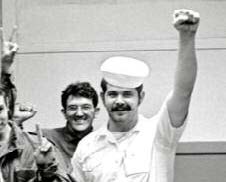I joined the US Navy for a lot of reasons, both practical and principled. But it wasn’t until unfavorable circumstances cornered me that I seriously considered enlisting. “Men make their own history,” as Marx wrote. “But they do not make it as they please.”
I had just finished college with a wonderful but economically worthless degree. I found a job at Home Depot, loading 90-pound bags of concrete into contractors’ trucks.
I knew the Navy represented a sacrifice of many youthful years. But I needed to pay down school debt and build up an emergency fund. The GI Bill was an impressive deal.
Others hoped to travel the world, and I did travel to many ports all over the globe. But I saw this more as a happy side effect from a larger unhealthy treatment—a chemotherapy called “deployments.”
But long after the money was saved and spent—the GI Bill used up—I would be most proud that I helped to spread working-class consciousness inside the Navy. Spreading ideas that will make for a better society to a very important section of society that rarely comes in contact with these ideas.
Sailors and marines are thoroughly indoctrinated into a military mindset. This includes potent cold war anti-communism that equates left-wing politics with terrorism.
My boot camp training guide listed very left-wing radical organizations as terrorist organizations. It didn’t list specific groups, leaving sailors with a vague belief that anybody too left of a red-white-and-blue trust in unfettered capitalism was a terrorist, or at least in cahoots with terrorists.
Making Friends and Raising Politics
My first year started when I hopped onto a bus to be shipped to the Navy’s Great Lakes training center (boot camp). It ended when I left A-school and joined the Fleet.
In boot camp I met people from all over the world. One bunkmate was a chemist from Africa seeking US citizenship through military service. Unfortunately, he failed the TB test and was thrown out.
I sifted through people trying to find ones who were interested in philosophy, dialectics, politics, or even Marxism. I found that religious people tended to be interested talking about philosophy.
If any conversation came close to politics, it usually involved racism or sexism. Calling out racism usually seemed to be the end game. As long as it was recognized, everybody thought it was a job well done. Rarely did I meet people concerned about analyzing the roots of racism and sexism or doing things to change their observations.
I met another guy in my division. We were surprisingly similar. He was a little older, like myself, and mature enough to endure boot camp indoctrination without it inflicting anything more than a few headaches.

During the US war in Vietnam, sailors played an active role in the anti-war movement
He came from South America and lived through some terrible times with drug wars in the 90s. This made him a great deal more politically conscious. In college, he was a business major, and a little disappointed with his studies. We hit it off and started talking about philosophy and economics, then dialectics and capitalism, and eventually about Marxism.
All seamen headed to A-schools after boot camp, where they would further train in their specific rate. Luckily, my new friend and I were heading to the same A-school. And our 27-week training program was one of the longer ones.
A-school was still pretty restrictive, but much easier than boot camp. We had more time to hang out and discuss politics. We read an article that was a great introduction to dialectics. (marxistphilosophy.org/Intro/DialIntro.pdf). We looked over a book on dialectics. We also read a book that gave a Marxist class analysis of the drug wars where he grew up.
We built a strong friendship and ended up in the same city. We didn’t see much of each other because I was deployed when his ship was in port and vice versa. But at my new command I made more friends, who would become close to me after we deployed together.
I was learning a lot very quickly. It was a stressful time and probably the most difficult period of my enlistment to reach out to sailors and discuss working-class ideas and communism. And yet during this period I met one of my closest friends and someone who not only cares about society but who wants to fight the good fight.
We do make our own history, and sometimes we make it better than we anticipated.


